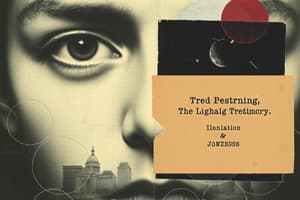Podcast
Questions and Answers
What is the possible problem that can arise when a police fingerprint analyst is exposed to contextual information about a suspect?
What is the possible problem that can arise when a police fingerprint analyst is exposed to contextual information about a suspect?
- Confirmation bias (correct)
- Anchoring bias
- Hindsight bias
- Availability heuristic
What is one way to disentangle the possibility that the original memory gets overwritten or changed from the possibility that there are now two memories, but the original one becomes less accessible?
What is one way to disentangle the possibility that the original memory gets overwritten or changed from the possibility that there are now two memories, but the original one becomes less accessible?
- Having participants bet money on their answers (correct)
- Using a polygraph test to detect deception
- Examining the effects of factors like alcohol consumption on misinformation acceptance
- Presenting a choice between the correct item and a novel item
What is the potential problem if a police fingerprint analyst is exposed to information about a suspect's criminal record and the violent nature of the crime?
What is the potential problem if a police fingerprint analyst is exposed to information about a suspect's criminal record and the violent nature of the crime?
- The analyst will be more thorough in their analysis
- The analyst will be more objective in their analysis
- The analyst will be less experienced in their analysis
- The analyst's judgment may be biased towards finding a match (correct)
What is one mechanism by which misinformation might act?
What is one mechanism by which misinformation might act?
What is a technique that can be used to examine the effects of factors like alcohol consumption on misinformation acceptance?
What is a technique that can be used to examine the effects of factors like alcohol consumption on misinformation acceptance?
What is one way to disentangle the possibility that there was no original memory from the possibility that the original memory gets overwritten or changed?
What is one way to disentangle the possibility that there was no original memory from the possibility that the original memory gets overwritten or changed?
What is the term for the tendency to interpret information in a way that confirms one's preconceptions?
What is the term for the tendency to interpret information in a way that confirms one's preconceptions?
What is one mechanism by which misinformation might act, where the original memory is still present but becomes less accessible?
What is one mechanism by which misinformation might act, where the original memory is still present but becomes less accessible?
What is the purpose of the forewarning tactic used by lawyers?
What is the purpose of the forewarning tactic used by lawyers?
What is the primary goal of the death-qualification process in jury selection?
What is the primary goal of the death-qualification process in jury selection?
What is a potential problem with the eyewitness identification evidence in the case that goes to trial 12 months later?
What is a potential problem with the eyewitness identification evidence in the case that goes to trial 12 months later?
What is the term for the psychological effect where the presence of a weapon during an event can impair a witness's memory for other details?
What is the term for the psychological effect where the presence of a weapon during an event can impair a witness's memory for other details?
What is the consequence of using a death-qualified jury, according to research?
What is the consequence of using a death-qualified jury, according to research?
Why does the use of sketchplans, as in the case of the woman who heard screams in the Dunedin Botanic Gardens, improve witness memory?
Why does the use of sketchplans, as in the case of the woman who heard screams in the Dunedin Botanic Gardens, improve witness memory?
Why is rapport building important when interviewing child witnesses?
Why is rapport building important when interviewing child witnesses?
What is the likely reason why the child's attention was drawn away from other important aspects of the event?
What is the likely reason why the child's attention was drawn away from other important aspects of the event?
According to research, what is an alternative explanation for the inconsistencies in the child's testimony during cross-examination?
According to research, what is an alternative explanation for the inconsistencies in the child's testimony during cross-examination?
What is the purpose of using foils in a photographic lineup, according to research by Clark and Tunnicliff (2001)?
What is the purpose of using foils in a photographic lineup, according to research by Clark and Tunnicliff (2001)?
What is the recommended approach to rapport building in investigative interviews with child witnesses?
What is the recommended approach to rapport building in investigative interviews with child witnesses?
What is the term for the process of presenting a weak version of the opposing argument to immunize the jurors against the stronger version?
What is the term for the process of presenting a weak version of the opposing argument to immunize the jurors against the stronger version?
What qualities are associated with positive experiences for victims during police interviews, according to Jakobsen (2017)?
What qualities are associated with positive experiences for victims during police interviews, according to Jakobsen (2017)?
What is a potential problem with the bank teller's testimony in the case that goes to trial 12 months later?
What is a potential problem with the bank teller's testimony in the case that goes to trial 12 months later?
According to Clark and Tunnicliff (2001), how should foils be selected for a lineup?
According to Clark and Tunnicliff (2001), how should foils be selected for a lineup?
What is the purpose of the stealing thunder technique?
What is the purpose of the stealing thunder technique?
What can be used to avoid bias in forensic decision-making, especially when the evidence is ambiguous?
What can be used to avoid bias in forensic decision-making, especially when the evidence is ambiguous?
What is the consequence of using a direct questioning style during rapport building, according to Sternberg et al. (1997)?
What is the consequence of using a direct questioning style during rapport building, according to Sternberg et al. (1997)?
What is the term for the process of directly questioning the credibility of witnesses or evidence presented by the prosecution?
What is the term for the process of directly questioning the credibility of witnesses or evidence presented by the prosecution?
What is a potential problem with the long delay between the event and the trial in the case that goes to trial 12 months later?
What is a potential problem with the long delay between the event and the trial in the case that goes to trial 12 months later?
What is a death-qualified jury?
What is a death-qualified jury?
What is the primary goal of constructing a lineup, according to Clark and Tunnicliff (2001)?
What is the primary goal of constructing a lineup, according to Clark and Tunnicliff (2001)?
What is the purpose of a sketchplan, as used in the case of the woman who heard screams in the Dunedin Botanic Gardens?
What is the purpose of a sketchplan, as used in the case of the woman who heard screams in the Dunedin Botanic Gardens?
What is a dissuasion technique that can be used by the defence lawyer to dissuade jurors from believing the prosecution's case?
What is a dissuasion technique that can be used by the defence lawyer to dissuade jurors from believing the prosecution's case?
What is the consequence of excluding jurors who are categorically opposed to the death penalty?
What is the consequence of excluding jurors who are categorically opposed to the death penalty?
Is the judge correct that the death-qualified jury will have no bearing on whether or not the defendant is found guilty?
Is the judge correct that the death-qualified jury will have no bearing on whether or not the defendant is found guilty?
What is the encoding specificity principle, which is related to the use of sketchplans?
What is the encoding specificity principle, which is related to the use of sketchplans?
What is the likely outcome of cross-examination on the accuracy of children's reports?
What is the likely outcome of cross-examination on the accuracy of children's reports?
What is the recommended approach to interviewing child witnesses, according to research?
What is the recommended approach to interviewing child witnesses, according to research?
What is the purpose of using a simultaneous photographic lineup, as used in the case of the woman who heard screams in the Dunedin Botanic Gardens?
What is the purpose of using a simultaneous photographic lineup, as used in the case of the woman who heard screams in the Dunedin Botanic Gardens?
What is the purpose of increasing motivation and ability in presenting technical evidence according to the Elaboration Likelihood Model?
What is the purpose of increasing motivation and ability in presenting technical evidence according to the Elaboration Likelihood Model?
What is the goal of deterrence in criminal sentencing?
What is the goal of deterrence in criminal sentencing?
According to research, what is crucial for deterrence to be effective?
According to research, what is crucial for deterrence to be effective?
Why might the judge's intent to use the sentence as a deterrent be limited?
Why might the judge's intent to use the sentence as a deterrent be limited?
What is the primary route to persuasion according to the Elaboration Likelihood Model?
What is the primary route to persuasion according to the Elaboration Likelihood Model?
What might lawyers do if they anticipate that jurors' motivation or ability to centrally process evidence will be low?
What might lawyers do if they anticipate that jurors' motivation or ability to centrally process evidence will be low?
What is the risk if potential offenders believe the chances of detection are low?
What is the risk if potential offenders believe the chances of detection are low?
What is required for deterrence to be successful?
What is required for deterrence to be successful?
What is the benefit of selecting foils that match the witness's description in a lineup?
What is the benefit of selecting foils that match the witness's description in a lineup?
Why might a witness's testimony change during cross-examination?
Why might a witness's testimony change during cross-examination?
What is the 'shooter bias' phenomenon?
What is the 'shooter bias' phenomenon?
What can occur when witnesses discuss an event with each other?
What can occur when witnesses discuss an event with each other?
What is the benefit of using lineups with foils that match the witness's description?
What is the benefit of using lineups with foils that match the witness's description?
Why might a police officer mistakenly perceive a threat from an unarmed Black individual?
Why might a police officer mistakenly perceive a threat from an unarmed Black individual?
What is the 'weapon focus effect'?
What is the 'weapon focus effect'?
What is a potential problem with using the consistency of witnesses' accounts as an indicator of accuracy?
What is a potential problem with using the consistency of witnesses' accounts as an indicator of accuracy?
What is the benefit of using research to support an alternative explanation for inconsistencies in a witness's testimony?
What is the benefit of using research to support an alternative explanation for inconsistencies in a witness's testimony?
What is the potential consequence of using cross-examination questioning techniques on witness testimony?
What is the potential consequence of using cross-examination questioning techniques on witness testimony?
What is the phenomenon where witnesses may unconsciously bias their reports to align with the expectations or goals of the audience?
What is the phenomenon where witnesses may unconsciously bias their reports to align with the expectations or goals of the audience?
What theoretical model do jurors likely employ to make sense of the vast array of evidence presented during a trial?
What theoretical model do jurors likely employ to make sense of the vast array of evidence presented during a trial?
Why might the judge's strategy of instructing witnesses to disregard any information they've encountered in the media be ineffective?
Why might the judge's strategy of instructing witnesses to disregard any information they've encountered in the media be ineffective?
What is the term for the phenomenon where jurors selectively attend to and interpret evidence in a way that confirms their initial story?
What is the term for the phenomenon where jurors selectively attend to and interpret evidence in a way that confirms their initial story?
What is the main reason why jurors construct a narrative or 'story' based on the evidence, their personal knowledge, and their expectations of what a complete story should entail?
What is the main reason why jurors construct a narrative or 'story' based on the evidence, their personal knowledge, and their expectations of what a complete story should entail?
What is the purpose of the 'story model' of decision-making in the context of a trial?
What is the purpose of the 'story model' of decision-making in the context of a trial?
What is the motivation behind jurors' construction of a story that makes sense of the events and aligns with their pre-existing beliefs and expectations?
What is the motivation behind jurors' construction of a story that makes sense of the events and aligns with their pre-existing beliefs and expectations?
What is the main challenge for lawyers in trials involving vast quantities of boring and highly technical accounting evidence?
What is the main challenge for lawyers in trials involving vast quantities of boring and highly technical accounting evidence?
What is the likely outcome if jurors are instructed to disregard information encountered in the media, according to the theory of ironic processes?
What is the likely outcome if jurors are instructed to disregard information encountered in the media, according to the theory of ironic processes?
What is the term for the phenomenon where people are motivated to maintain their freedom, and instructions to disregard information may be seen as an attempt to limit that freedom?
What is the term for the phenomenon where people are motivated to maintain their freedom, and instructions to disregard information may be seen as an attempt to limit that freedom?
Flashcards are hidden until you start studying
Study Notes
Misinformation and Eyewitness Testimony
- People may report incorrect information they encountered from another witness, leading to misinformation.
- Four potential mechanisms by which misinformation might act:
- The person reports misinformation but knows it's wrong.
- The original memory gets overwritten or changed.
- There are two memories, but the original one becomes less accessible.
- There was no original memory (no encoding).
- Researchers can disentangle these possibilities using techniques like having participants bet money on their answers or presenting a choice between the correct item and a novel item.
Confirmation Bias in Forensic Analysis
- Confirmation bias can occur when forensic analysts have prior knowledge of a case, influencing their judgments.
- This can be avoided by using a double-blind procedure where the analyst is unaware of contextual information.
- Research has shown that contextual information can bias forensic decision-making, especially when the evidence is ambiguous.
Eyewitness Identification Evidence
- Eyewitness confidence is often a poor indicator of accuracy, with confident witnesses not necessarily more accurate.
- Eyewitness identification evidence is highly fallible and susceptible to various biases.
- A long delay between the event and the trial increases the risk of memory distortion and contamination.
Improving Witness Memory with Sketchplans
- Research supports the use of sketchplans to improve witness memory.
- Providing a sketchplan increases both the amount and accuracy of information reported by witnesses.
- This is because the act of drawing the scene helps the witness mentally reinstate the spatial and contextual details.
Selecting Foils for Lineups
- Foils for lineups should be selected to match the witness's description of the perpetrator, rather than the suspect.
- This ensures the lineup is a fair test of the witness's ability to identify the perpetrator.
Dissuasion Techniques in Trials
- Four dissuasion techniques discussed in class:
- Forewarning: telling jurors in advance what the prosecution will argue, reducing the impact of those arguments.
- Inoculation: presenting a weak version of the opposing argument, making the jury less susceptible to stronger versions.
- Stealing thunder: revealing damaging information about one's own case before the prosecution can, taking away the surprise factor.
- Credibility challenges: directly questioning the credibility of witnesses or evidence presented by the prosecution.
The Weapon Focus Effect
- The presence of a weapon during an event can impair a witness's memory for other details in the scene.
- This is known as the "weapon focus effect".
- The weapon captures the witness's attention, leaving fewer resources available for encoding other contextual information.
Death-Qualified Juries
- A "death-qualified" jury is composed of individuals who are willing to consider the death penalty as a sentencing option.
- Research has shown that this process introduces significant bias into the jury, with death-qualified jurors more likely to favor the prosecution's viewpoint.
Child Witnesses and Rapport Building
- Building rapport with child witnesses is crucial, as it can increase the informativeness of their testimony.
- An open-ended approach to rapport building, where the child feels listened to and comfortable sharing their account, is more effective than a direct questioning style.
Cross-Examination and Witness Testimony
- Cross-examination techniques can elicit changes in testimony, even for accurate responses.
- This is because suggestive and demanding questioning can undermine the reliability of witness testimony.
Shooter Bias and Racial Stereotypes
- Research on the "shooter bias" phenomenon demonstrates that individuals, including police officers, are quicker to mistakenly "shoot" unarmed Black targets compared to unarmed White targets.
- This bias arises from cultural stereotypes associating Black individuals, especially young Black males, with criminality and danger.
Co-Witness Discussion and Audience Tuning
- The "co-witness discussion" effect can lead to memory contamination, where witnesses who discuss an event inadvertently influence each other's memories.
- Alternatively, witnesses may unconsciously bias their reports to align with the expectations or goals of the investigator (audience tuning).
Juror Decision-Making and the Story Model
-
Jurors employ the "story model" of decision-making, constructing a narrative based on the evidence, personal knowledge, and expectations.
-
They evaluate this story based on criteria such as coverage, uniqueness, and coherence.### Influence of Pre-trial Publicity on Jurors
-
Instructing witnesses to disregard media information may not be effective in mitigating its influence on jurors.
-
Research shows that such instructions can backfire and make the problem worse, rather than resolving it.
-
Two theoretical explanations for this phenomenon are:
- The theory of ironic processes, which suggests that people may end up thinking about something more when they're told not to.
- Reactance theory, which posits that people resist instructions that limit their freedom.
Persuading Jurors with the Elaboration Likelihood Model (ELM)
- The ELM states that persuasion can occur through either a central route (high cognitive effort) or a peripheral route (superficial cues).
- To encourage central processing, lawyers should:
- Increase motivation (make evidence relevant to jurors)
- Increase ability to engage with the material (present evidence clearly and avoid jargon)
- If motivation or ability is low, lawyers should encourage peripheral processing by:
- Decreasing motivation (make material less self-relevant)
- Decreasing ability (introduce confusing language or technical details)
- Ensure favorable peripheral cues (witness reputation or appearance)
Deterrence and Sentencing
- Deterrence aims to discourage future criminal behavior through specific or general deterrence.
- Research on the effectiveness of deterrence is mixed, and punishment may not prevent future offending.
- For deterrence to be successful, it requires emphasizing both the severity of punishment and the likelihood of apprehension.
- High visibility enforcement and perceived risk of being caught are crucial for deterrence to work effectively.
Studying That Suits You
Use AI to generate personalized quizzes and flashcards to suit your learning preferences.




